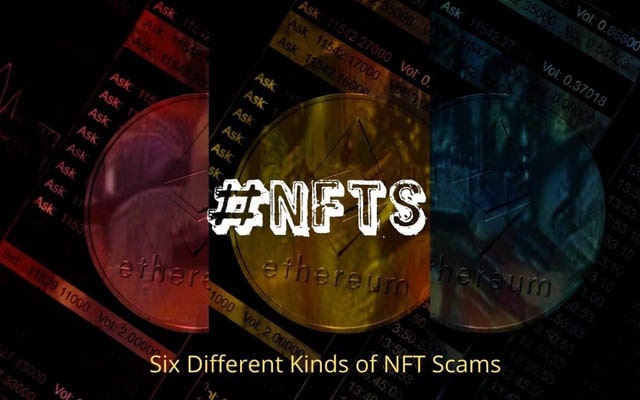What are the Different Kinds of NFT Scams?

NFTs, or Non-Fungible Commemoratives, have surfaced as the newest mode. NFT art and collectibles are dealing for millions of bones each around the world. However, the emergence of NFTs in the mainstream media and on the world, stage is no surprise, If you're a crypto geek. There have been cryptographic commemoratives for a while but the oneness factor that NFTs bring for an asset in the digital space has introduced a new world of occasion.
NFT prices have risen sprucely as numerous new models have come to light. Celebrities each around the world are entering the space driving the coming influencer period through NFTs. Digital real estate, collectibles, only suckers, sports, and potentially any and all diligence are exploring NFTs.
By carrying, it means that you enjoy a particular hash on the Blockchain which represents some unique parcels and an asset in any form similar to an image or a videotape. Together, the characteristics and the asset form a hash which is stored on the inflexible tally of Blockchain and allocated to a particular druggies' portmanteau address or public address.
From the current smash and invention in space, it's apparent that NFTs will be around for a long time, but numerous people in the assiduity are still in the dark about what they are. And on top of that, they've no idea how to defend themselves if they want to enter the NFT request, which is pivotal because scammers are staying to take advantage.
Just like any assiduity that grows snappily, the chances of swindles and frauds also grow exponentially. Piecemeal from the egregious loopholes in the smart contracts audit of the NFTs, there are numerous implicit ways in which a stoner can end up losing all their savings.
Let’s look at some of the most common forms of NFT scams.
1. Replica NFT Marketplaces
Replica stores are a well- known source of internet fraud around the world. To commit fraud, scammers produce fake websites that appear precisely like the real thing. They also try to mislead people into furnishing login watchwords or credit card details. Online businesses in a wide range of sectors, including those dealing with NFTs, are being attacked, as a result of this.
In comparison to previous months, the number of suspicious- looking sphere enrollments for NFT shop names like Rarible, "Opensea," and Audius surged by over 300 in March 2021
Replica NFT stores may act as rip-offs of Real NFT stores. A real NFT business's totem, a website structure that looks similar, and the trade of NFTs available from the factual store are all emblems of the rip-off.
2. Fake NFT Marketplaces
Fake NFT stores are now appearing that use the original store’s URL’s keywords or similar terms. The website will act the way you're used to, and the scammers may try to wisecrack you into copying a fake NFT or furnishing them with your private key. Keep an eye on the URL and the system by which you arrived at the website, and report any suspicious exertion.
These figures indicate that there will be an increase in NFT frauds in the future, and all preventives must be taken to cover against these scams.
3. Artist Impersonation
Anyone may commit digital art theft and pass it off as their own. They try to sell well- known NFTs for a low price and succeed in doing so for a small number of deals before their accounts are terminated.
4. Brand Impersonation
This has been a current fraud in cryptocurrencies since the morning and has spread to the NFT space as well. Brand Impersonation is making analogous accounts to the original account.
As a preventative step, norway give out your private keys to anybody, norway input them online, and constantly be aware of the position of your NFT quests.
MetaMask is an excellent tool for connecting to and using dapps, but be aware of the warrants you give these dapps. Maintain acceptable safety and security online, and you wo n’t have to worry about this as much. However, report the account so that you might maybe deliver someone differently, If you come across someone acting illegitimately.
5. Fake Giveaways/Airdrops
Giveaways and Airdrops are veritably common in the Cryptoverse. Scammers are now taking advantage of this system to give fake Airdrops with vicious intent.
Scammers target crypto suckers in these frauds by promising them free crypto/ NFTs/ commemoratives connected to NFT requests. Also, They target well- known cryptocurrencies, as well as companies and individualities combined with them.
6. NFT Bidding Gimmick
Retaining an NFT means you ’re going to want to link it to OpenSea, which is a fantastic business to look around for NFTs, buy them, and vend them, but it also comes with some troubles.
On OpenSea, a nasty fraud has just appeared in which stab used USDC currency rather of WETH or ETH to bid what you want to vend your NFT for. Avoiding this fiddle may feel simple enough, but some scammers go the redundant afar by changing their profile picture to include the WETH totem, leading you to believe " Wow, someone just bid5.3 WETH for my piece!" without double-checking, leading you to vend your commemoratives and discover you entered 5.3 USDC in return. This may be avoided by just being patient and thorough while assessing your proffers.
Scammers take advantage of this blatant lack of common sense. As an advance step to stop frauds, report the lawbreaker to the NFT’s Disharmony garçon and get them banned if they're formerly on there.
Final Words
The NFT smash is real and so are the swindles. There are several frauds out there, but it's our responsibility to be apprehensive of these swindles and take preventative measures.
It's judicious not to click on any arbitrary links distributed in communities or on social media. Likewise, if you have a significant investment in NFTs, we explosively advise you to consider copping a tackle portmanteau similar to Trezor or Ledger.



